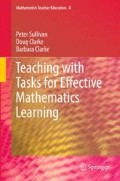Abstract
This chapter summarises some research results and scholarly commentary that emphasise the importance of mathematical tasks, and the ways they contribute to learning, the role of teacher knowledge in the effective use of tasks, the ways that teacher beliefs and attitudes influence the use of tasks, the nature of the constraints that teachers can anticipate, and the ways that each of these influence the teacher intentions. Particular recommendations about task creation, selection, and use are presented.
References
Anthony, G., & Walshaw, M. (2009). Effective pedagogy in mathematics. Educational series 19. Brussels: International Academy of Education; Geneva: International Bureau of Education.
Association of Teachers of Mathematics (ATM). (1988). Reflections on teacher intervention. Derby, UK: ATM.
Brown, R. & Renshaw, P. (2006). Transforming practice: Using collective argumentation to bring about change in a year 7 mathematics classroom. In P. Grootenboer, R. Zevenbergen, & M. Chinnapan (Eds), Identities, cultures and learning spaces **(Proceedings of the 29th Conference of the Mathematics Education Research Group of Australasia, pp. 99–107). Canberra. July.
Charalambous, C. Y. (2008). Mathematical knowledge for teaching and the unfolding of tasks in mathematics lessons: Integrating two lines of research. In O. Figuras, J. L. Cortina, S. Alatorre, T. Rojano, & A. Sepulveda (Eds.), Proceedings of the 32nd **Annual Conference of the International Group for the Psychology of Mathematics Education (Vol. 2, pp. 281–288). Morelia: PME.
Christiansen, B., & Walther, G. (1986). Task and activity. In B. Christiansen, A. G. Howson, & M. Otte (Eds.), Perspectives on mathematics education (pp. 243–307). The Netherlands: Reidel.
Cobb, P., & McClain, K. (1999). Supporting teachers’ learning in social and institutional contexts. In Fou-Lai Lin (Ed.), Proceedings of the 1999 International Conference on Mathematics Teacher Education (pp. 7–77). Taipei: National Taiwan Normal University
Delpit, L. (1988). The silenced dialogue: Power and pedagogy in educating other people’s children. Harvard Educational Review, 58(3), 280–298.
Desforges, C., & Cockburn, A. (1987). Understanding the mathematics teacher: A study of practice in first schools. London: The Falmer Press.
Doyle, W. (1986). Classroom organisation and management. In M. C. Wittrock (Ed.), Handbook of research on teaching (pp. 392–431). New York: Macmillan.
Ernest, P. (1988). The attitudes and practices of student teachers of primary school mathematics. In A. Borbas (Ed.), Proceedings of the Annual Conference of Pyschology of Mathematics Education (Vol. 2, pp. 288–295). Beszprem, Hungary: PME.
Gee, J. P. (2004). Learning by design: Games as learning machines. http://labweb.education.wisc.edu/room130/jim.htm. Accessed 25 Apr 2005.
Griffin, S., & Case, R. (1997). Re-thinking the primary school with curriculum: An approach based on cognitive science. Issues in Education, 3(1), 1–49.
Hannula, M. (2004). Affect in mathematical thinking and learning. Turku: Turun Yliopisto.
Hiebert, J., & Wearne, D. (1997). Instructional tasks, classroom discourse and student learning in second grade arithmetic. American Educational Research Journal, 30(2), 393–425.
Hill, H. C., Ball, D. L., & Schilling, S. G. (2008). Unpacking pedagogical content knowledge: Conceptualising and measuring teachers’ topic-specific knowledge of students. Journal for Research in Mathematics Education, 39(4), 372–400.
Kuhs, T. M., & Ball, D. L. (1986). Approaches to teaching mathematics: Mapping the domains knowledge, skills, and dispositions. East Lansing, MI: Michigan State University Center on Teacher Education.
Nisbet, S., & Warren, E. (2000). Primary school teachers’ beliefs relating to mathematics, teaching and assessing mathematics and factors that influenced those beliefs. Mathematics Teacher Education and Development, 2, 34–47.
Philipp, R. A. (2007). Mathematics teachers’ beliefs and affect. In F. K. Lester (Ed.), Second handbook of research on mathematics teaching and learning (pp. 257–315). Charlotte, NC: Information Age Publishing & National Council of Teachers of Mathematics.
Rowland, T., Huckstep, P., & Thwaites, A. (2005). Elementary teachers' mathematics subject knowledge: The knowledge quartet and the case of Naomi. Journal of Mathematics Teacher Education, 8(3), 255–281.
Shulman, L. S. (1986). Those who understand: Knowledge growth in teaching. Educational Researcher, 15(2), 4–14.
Stein, M. K., Grover, B. W., & Henningsen, M. (1996). Building student capacity for mathematical thinking and reasoning: An analysis of mathematical tasks used in reform classrooms. American Educational Research Journal, 33(2), 455–488.
Stein, M. K., & Lane, S. (1996). Instructional tasks and the development of student capacity to think and reason and analysis of the relationship between teaching and learning in a reform mathematics project. Educational Research and Evaluation, 2(1), 50–80.
Sullivan, P., Mousley, J., & Zevenbergen, R. (2006). Developing guidelines for teachers helping students experiencing difficulty in learning mathematics. In P. Grootenboer, R. Zevenbergen & M. Chinnappan (Eds.), Identities, cultures and learning spaces **(Proceedings of the 29th annual conference of the Mathematics Education Research Group of Australasia, pp. 496–503). Sydney: MERGA.
Swan, M. (2005). Improving learning in mathematics: Challenges and strategies. UK: Department for Education and Skills Standards Unit.
Thompson, A. G. (1992). Teachers’ beliefs and conceptions: A synthesis of research. In D. A. Grouws (Ed.), Handbook of research on mathematics teaching and learning (pp. 127–146). New York: Macmillan.
Tschannen-Moran, M., Hoy, A., & Hoy, W. (1998). Teaching efficacy: Its meaning and measure. Review of Educational Research, 68(2), 202–248.
Tzur, R. (2008). A researcher perplexity: Why do mathematical tasks undergo metamorphosis in teacher hands? In O. Figuras, J. L. Cortina, S. Alatorre, T. Rojano, & A Sepulveda (Eds.), Proceedings of the 32nd Annual Conference of the International Group for the Psychology of Mathematics Education (pp. 1–139, 147). Morelia: PME.
Watson, A., & Sullivan, P. (2008). Teachers learning about tasks and lessons. In D. Tirosh & T. Wood (Eds.), Tools and resources in mathematics teacher education (pp. 109–135). Rotterdam: Sense Publishers.
Author information
Authors and Affiliations
Rights and permissions
Copyright information
© 2013 Springer Science+Business Media New York
About this chapter
Cite this chapter
Sullivan, P., Clarke, D., Clarke, B. (2013). Tasks and Mathematics Learning. In: Teaching with Tasks for Effective Mathematics Learning. Mathematics Teacher Education, vol 104. Springer, New York, NY. https://doi.org/10.1007/978-1-4614-4681-1_3
Download citation
DOI: https://doi.org/10.1007/978-1-4614-4681-1_3
Published:
Publisher Name: Springer, New York, NY
Print ISBN: 978-1-4614-4680-4
Online ISBN: 978-1-4614-4681-1
eBook Packages: Humanities, Social Sciences and LawEducation (R0)

